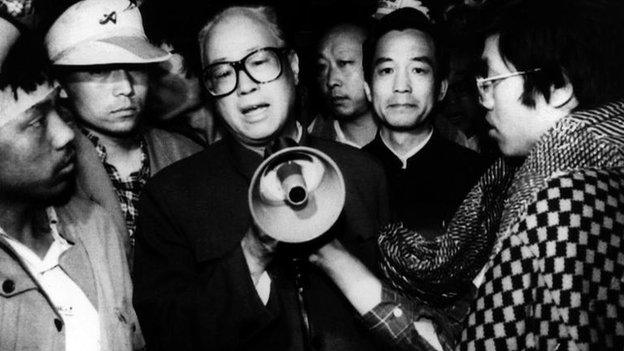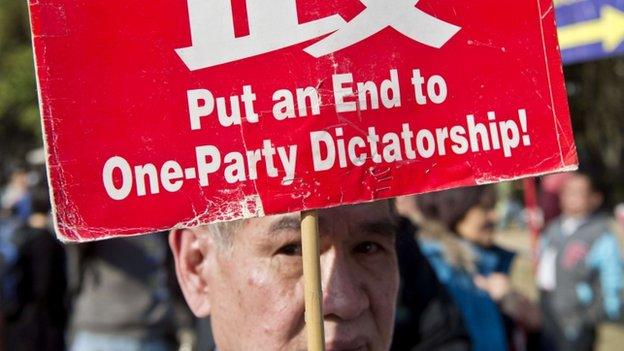Long-lost Zhao Ziyang letter inspires activists
- Published

Mr Zhao used a megaphone to tearfully ask students at Tiananmen Square to disperse
Here in Hong Kong, a semi-autonomous part of China that operates by different rules, there is a noisy and very public fight over the future of universal suffrage.
For the first time, voters are expecting to elect their chief executive, the city's top official, in 2017.
But recently, Chinese officials have suggested that only someone loyal to the Beijing government should lead Hong Kong.
The city's many democrats believe it is a sign that the current Communist Party leadership would never allow true democracy on Chinese soil.
Their campaign for political reform has been energised by the rediscovery of a letter written by former Premier Zhao Ziyang.
The University of Hong Kong Students' Union has just unearthed a letter, previously presumed lost, written by Mr Zhao to the students in May 1984.
At the time, the governments of China and Britain were in talks about the future of Hong Kong, then a Crown colony.
The two sides were just months away from signing the Sino-British Joint Declaration, a "divorce settlement" of sorts, outlining the terms by which Hong Kong would return to Chinese rule.
The students had written to Mr Zhao asking about the future of universal suffrage here.
Using plain everyday language, he wrote back, saying protecting the people's democratic rights was a basic principle of the government.
He assured the students there would, indeed, be democratic rule in Hong Kong.

Hong Kong is currently grappling with the future of universal suffrage in the territory
The message inspired young activists then and inspires them now, said Benny Tai, a former student leader.
In some ways, Mr Tai's life has not changed dramatically over the past three decades.
He is still at the University of Hong Kong, albeit now as a professor, and continues to call for democratic reforms.
Mr Tai is one of the organisers of a campaign of civil disobedience, called Occupy Central, potentially inviting voters to block the streets of the financial district to fight for genuine universal suffrage.
In this campaign, many see echoes of the idealistic demonstrators at Tiananmen Square in 1989.
It was Mr Zhao who, with a megaphone in hand and tears in his eyes, famously asked the students to disperse.
But he was, of course, unable to stop the violent crackdown that followed.
After losing a power struggle against his more hard-line rivals, Mr Zhao spent the last 15 years of his life under house arrest.
With the letter, he has been able to speak from beyond the grave, lending support to Hong Kong's current pro-democracy movement.